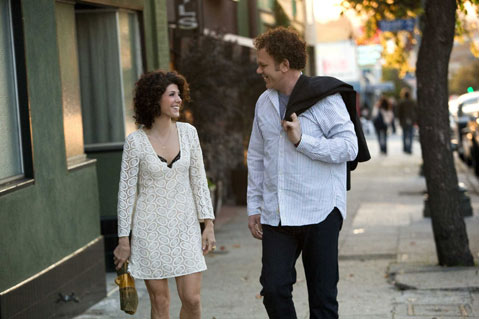Cyrus
John C. Reilly, Marisa Tomei, and Jonah Hill star in a film written and directed by Jay and Mark Duplass.

John C. Reilly, the homely-mugged and loveable guy with the pinched voice and generally confused demeanor, has been squirming around the edges of cinema for years, waiting for his due spotlight. He has served as a colorful character actor in indie films or as a goofball comic force in cahoots with Will Ferrell. With the surprisingly fresh and fine Cyrus, Reilly’s unique and pliable skills are more fully tapped. As a divorced man long adrift in love who stumbles into a relationship with a sensitive woman (Marisa Tomei) and wrestles with the machinations of her crafty son, Cyrus (Jonah Hill), Reilly showcases his fuller serio-comic range.
Cyrus is a categorically “small” film, but it is blessed with generous qualities, including an undertow of hangdog charisma and deft power to both tug at heartstrings and tickle funny bones. Much of the expressive voltage comes from the balancing act of its actors, from Reilly’s subtly detailed breadth to Hill’s deadpan cunning and Tomei’s signature, lived-in sensuality, and the trusty goodness of Catherine Keener in an anchoring role on the sideline. As the ex-wife of Reilly’s character, Keener acts as his voice of reason amid the spiraling weirdness of his new love situation.
But as a film, Cyrus rocks in new ways. Beautifully concocted and executed by brothers Jay and Mark Duplass (with brothers Ridley and Tony Scott as executive producers), the film wins considerable points for its sense of style, which keeps eluding easy categorization or formulation. No specific genre holds sway here. Comic aspects wriggle around the understated dramatic intensity, and smirking laughter turns to poignancy unexpectedly. Rough hand-held camera and improvisational-feeling dialogue lend a naturalistic, semi-mockumentary atmosphere to a piece that’s far more carefully paced and constructed than it seems.
In the end, this disarmingly wonderful and thoughtful midsummer release comes from its own school of cool, with nods to the indie scene, as well as the multiplex complex (not to mention the Oedipal complex). More importantly, though, this is a moment in American film when Reilly rules.



